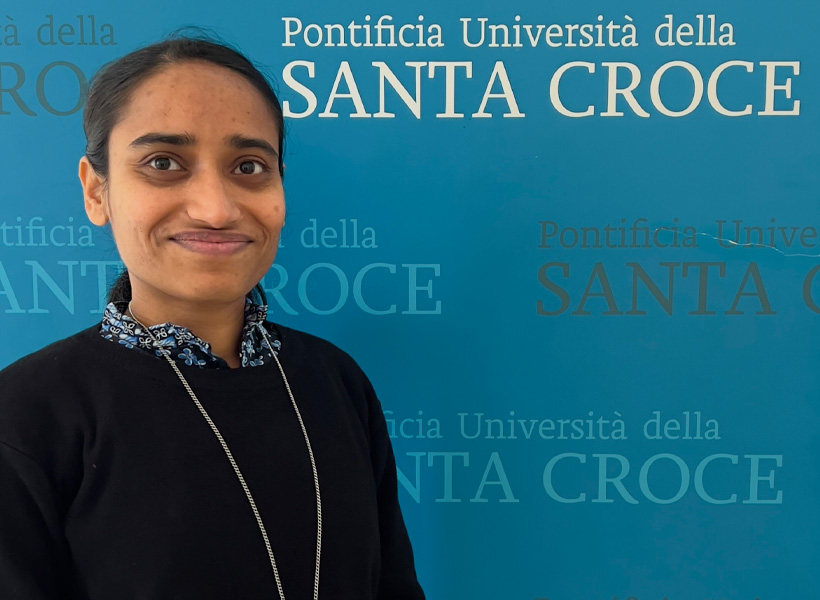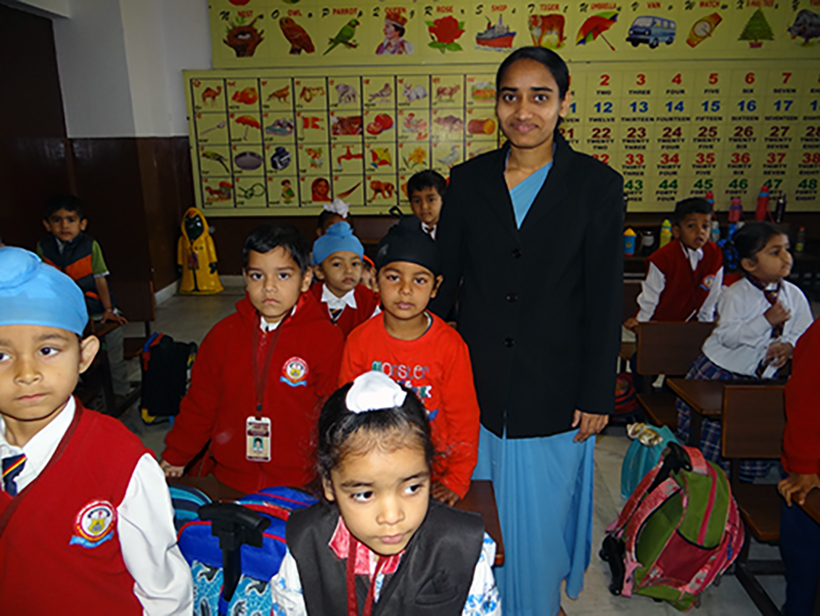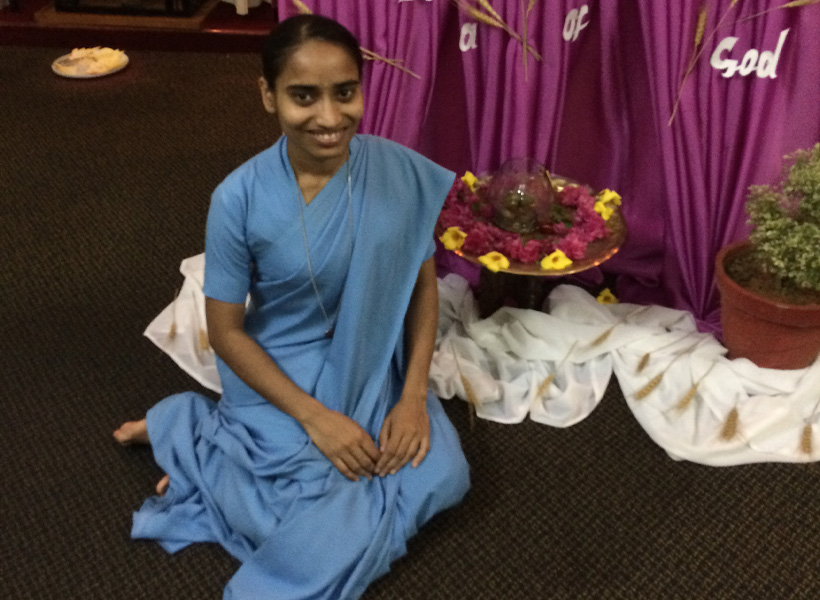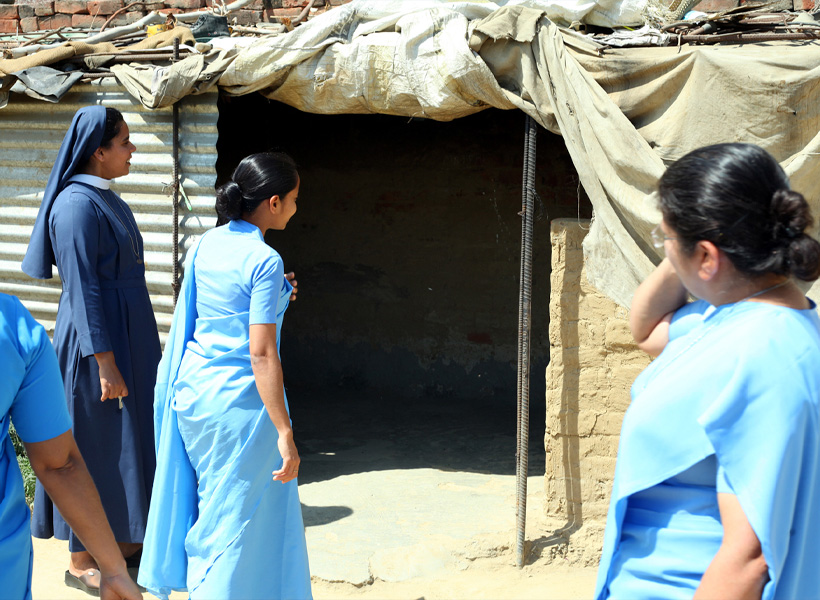
This nun from India was born in 1989 in Andhra Pradesh, and is currently pursuing a Bachelor's degree in Social and Institutional Communication at the University of India. Pontifical University of the Holy Cross. It has had the collaboration of the CARF Foundation, which awarded it with a partial study assistance.

His story is very particular, as he was born in a multi-religious environment. "I was born in a semi-Catholic family located in VisakhapatnamAndhra Pradesh, India. I have an older sister and brother. My home was not in the middle of a Hindu-majority society, but in a Catholic colony founded and established by French missionaries 150 years ago."Fathima recalls.
These missionaries were the ones who saw the need to protect the Christian faith in a Hindu society, and thus formed this Catholic colony that has resisted many difficulties imposed by the government and radical Hindu organizations.
Explains his family roots: "I have mentioned that my family was semi-Catholic because my mother came from a Hindu family. After marrying my father, who was a Catholic, she herself embraced Christianity and has remained faithful to the faith ever since.".
Visiting the places where his maternal relatives lived made him understand the difference between those who embraced Christ and those who did not. "Although my Hindu relatives live a very virtuous life, they lack the assurance of salvation and life after death. This has made me realize that it is very necessary to enter into a dialogue with them to make them see how they can fulfill this desire for salvation.".

Fathima explains that this does not necessarily mean that everyone has to convert to the Catholic faith, but that they have to find a way to embrace the eternal truth. "One of the greatest gifts I have received from my father is a firm faith in God and love for my neighbors, less privileged than me in faith. My father was very active in parish initiatives such as the St. Vincent de Paul Society. He also used to go camping (visiting places and preaching the Gospel on weekends). All these elements that resonated in my mind eventually convinced me that I was called to lead a different life.".
As a child and adolescent, she received an education from the Sisters of St. Joseph of Annecy. In those years, she was also deeply inspired by the charisms and apostolic activities of two other women's religious congregations: the Missionaries of Charity and the Poor Clares of Christ the King.
"Little by little, I felt attracted to dedicate my life as a religious, but I had to know what my path was. Thus, God led me to the Sisters of the Divine Savior (Salvatorian Sisters, a congregation with a universal identity and missionary spirit). In my parish there was a great devotion to St. Therese of the Child Jesus, which also prompted me to join the Salvatorian Sisters to become a missionary myself. I fell in love with their charism of making Christ known in every corner of the world."he recounts with emotion.
The Salvatorian Sisters were the first to bring the Christian faith to the people of northeast India. After six years of training, he finally made his profession with them and was assigned to Punjab, a state in northwest India.

Fathima tells how this journey has been since then, with its challenges and joys that have profoundly shaped her understanding of faith and service.
"The resilience and dedication I have witnessed in the face of adversity, especially among the marginalized communities we serve, have been a source of immense inspiration. Being a member of a missionary congregation is very enriching both personally and spiritually. It allows you to learn about the very diverse cultures of the world, which helps you to embrace different traditions and humanity with respect and love.".
After a year and a half of profession, he was called to Rome to help in the secretariat of the general administration of his generalate.
"Realizing the need for greater efficiency to advance my work and better contribute to my service as a communicator for the congregation, I was sent to study in Rome. Lacking the basic studies necessary for a bachelor's degree, I enrolled in the 5-year Institutional Communications program at the University of the Holy Cross in Rome."he says enthusiastically.
It so happens that the founder of his international congregation, also studied in Rome: the Blessed Francisco María de la Cruz Jordánwho founded the community in 1889.
"Nearing the end of my studies, I can safely say that I am now sufficiently trained to communicate and connect with people in various parts of the world, where our sisters serve, ensuring that all can know and love the one true God, Jesus Christ, Savior of the world."says the Hindu nun.
For this reason, he enthusiastically affirms that his "mission is to offer my expertise to all women religious in my congregation, close to 1,000 Salvatorian Sisters in 26 countries on five continents".
All of them live the timeless challenge of following Jesus by bringing the Gospel to the poor and empowering them to develop their own resources. They collaborate to promote justice and improve the quality of life in our world.
"Growing up in India and witnessing the countless charitable works and apostolates aimed at improving the values and morals of society inspired me greatly, eventually leading me to embrace this way of life. However, the heroic acts of women religious often go unnoticed by local authorities and society. This calls for dedicated communicators who can promote this cause with impartiality."he explains.
Among its challenges are to publicize the services of women religious, to highlight their efforts to foster a sense of solidarity and to encourage similar noble works.
He explains that these experiences have highlighted the importance of communication in bridging distances, fostering understanding and building communities based on the values of love, compassion and solidarity.
"The digital age presents a unique opportunity to amplify these stories, connect with a global audience and inspire collective action towards a more just and humane world, which inevitably has a positive effect on society. Hence, I aspire to put my studies at the service of women religious.
Looking to the future, I am full of hope and determination to use my education and experiences to further the mission of the Salvatorian Sisters."says Fathima Shirisha Giduthuri.
To this end, it aims to developing innovative communication strategies that highlight the vital work of women religious around the worldensuring that their voices are heard and their efforts are recognized.
Leveraging modern media tools and platforms, it aims to create a network of support and awareness that transcends geographical boundaries, uniting individuals and communities in a shared mission of faith and service. "Through these efforts, I am committed to promoting Gospel values and fostering a spirit of unity and collaboration in our global society.".
For all this formation received, he thanks the Pontifical University of the Holy Cross, which offers students the opportunity to learn about ecclesiastical communication, media training and social communication, enabling them to support the mission of the Church in their own territories or dioceses.
"I would like to give special thanks to my benefactors from the CARF Foundationwhose financial support for our studies made it possible to achieve an education in Rome. I remember their generosity with a grateful heart. Educating a priest or a religious is undoubtedly a noble task.I am very grateful to all of you, as these people end up bringing the fruits of their studies in a selfless way to the people in their own places. My sisters and I pray for all of you.".
Gerardo Ferrara
BA in History and Political Science, specializing in the Middle East.
Head of the student body at the Pontifical University of the Holy Cross in Rome.